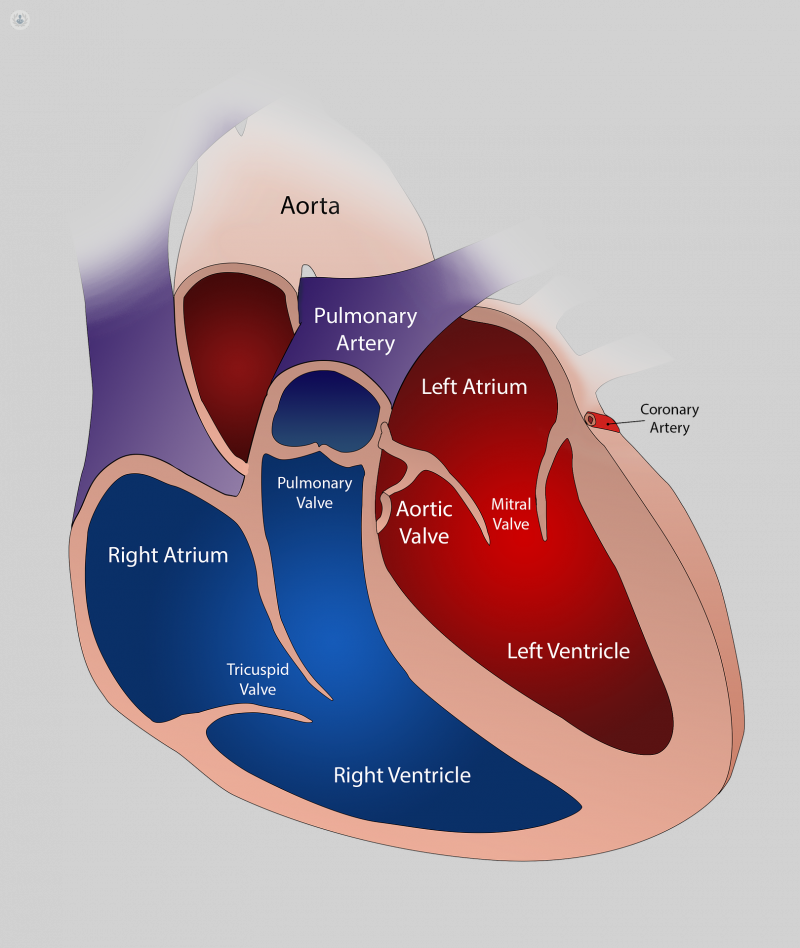Mitral valve regurgitation: what exactly is it?
Written by:Mitral valve regurgitation is one of the most common heart valve diseases, affecting up to eight per cent of the population. It can be confusing and scary to learn you have a heart condition, but knowing what to expect and understanding the condition better can be a reassuring step forward.
Mr Inderpaul Birdi, a leading cardiothoracic surgeon in London, is here to explain what this condition is and how to treat it.

What is the mitral valve?
The mitral valve is one of four valves in the heart. It regulates and allows blood to flow between the left atrium and left ventricle and is made up of two flaps - the anterior and posterior leaflets.
What is mitral regurgitation?
Mitral regurgitation occurs when the heart’s mitral valve doesn't close well enough during cardiac contraction, causing blood to leak and flow the wrong way in the heart. When this happens, and the left ventricle naturally contracts, blood is then incorrectly sent back towards the left atrium and towards the lungs.
If the mitral valve regurgitation is significant, then the heart cannot pump blood around the body efficiently, causing you to feel tired and out of breath. The blood that travels backward can cause dilatation and damage to the left atrium. This can lead to the development of irregular heartbeats, or palpitations, which ultimately causes a serious condition called atrial fibrillation.
Pulmonary hypertension, a type of high blood pressure, could also be caused as the lung vessels become damaged from the increased pressure. If early intervention is avoided, these conditions will become permanent.
The main reasons why the mitral valve can start to leak is either due to a rupture or prolapse of one of the two leaflets. This means the broken leaflets or flaps bulge back into the left atrium and prevent the mitral valve from closing properly.
There are other causes of mitral regurgitation, such as calcific degeneration (thickening of the tissue), damaged tissue cords, a previous heart attack, experiencing trauma or infection. All of these can damage the muscle that supports the mitral valve, affecting the overall function.
How serious is mitral regurgitation?
Mitral regurgitation can vary from mild to severe. When it’s mild, there may not be any symptoms. Sometimes, it can appear very quickly and an onset of sudden symptoms may appear. The condition is progressive and if left untreated, it can lead to more serious complications and eventually reduce your life span.
Can mitral regurgitation go away?
It doesn’t usually go away on its own. Normally, if left untreated, it will lead to further complications such as:
- Atrial fibrillation – an irregular and rapid heart rate. The upper chambers of the heart begin beating rapidly. This can cause blood clots which can ultimately result in a stroke. Patients with atrial fibrillation require blood thinners to prevent the risk of stroke.
- Pulmonary hypertension – a type of high blood pressure that affects the vessels in the lungs. This increases pressure and can lead to heart failure.
- Heart failure - when your heart becomes overloaded, it starts to dilate and weaken. Eventually, due to this added strain, it can also lead to heart failure.
What is the treatment for mitral regurgitation?
Surgery is normally the choice of treatment. Sometimes, if it’s mild it can be treated using medication, however surgical repair is usually necessary.
Early surgery is advised in some forms of mitral regurgitation and is very effective. A surgeon should always try to repair the mitral valve, but if this is not possible, then a replacement valve is often considered as soon as there are signs of symptoms.
There are various surgical approaches a surgeon can take, depending on the patient and the severity of the condition. Some surgeons are able to perform mitral valve surgery using minimally invasive (keyhole) heart procedures.
If you need more information on mitral valve regurgitation, do not hesitate to visit Mr Inderpaul Birdi's Top Doctors profile today to book an appointment.


